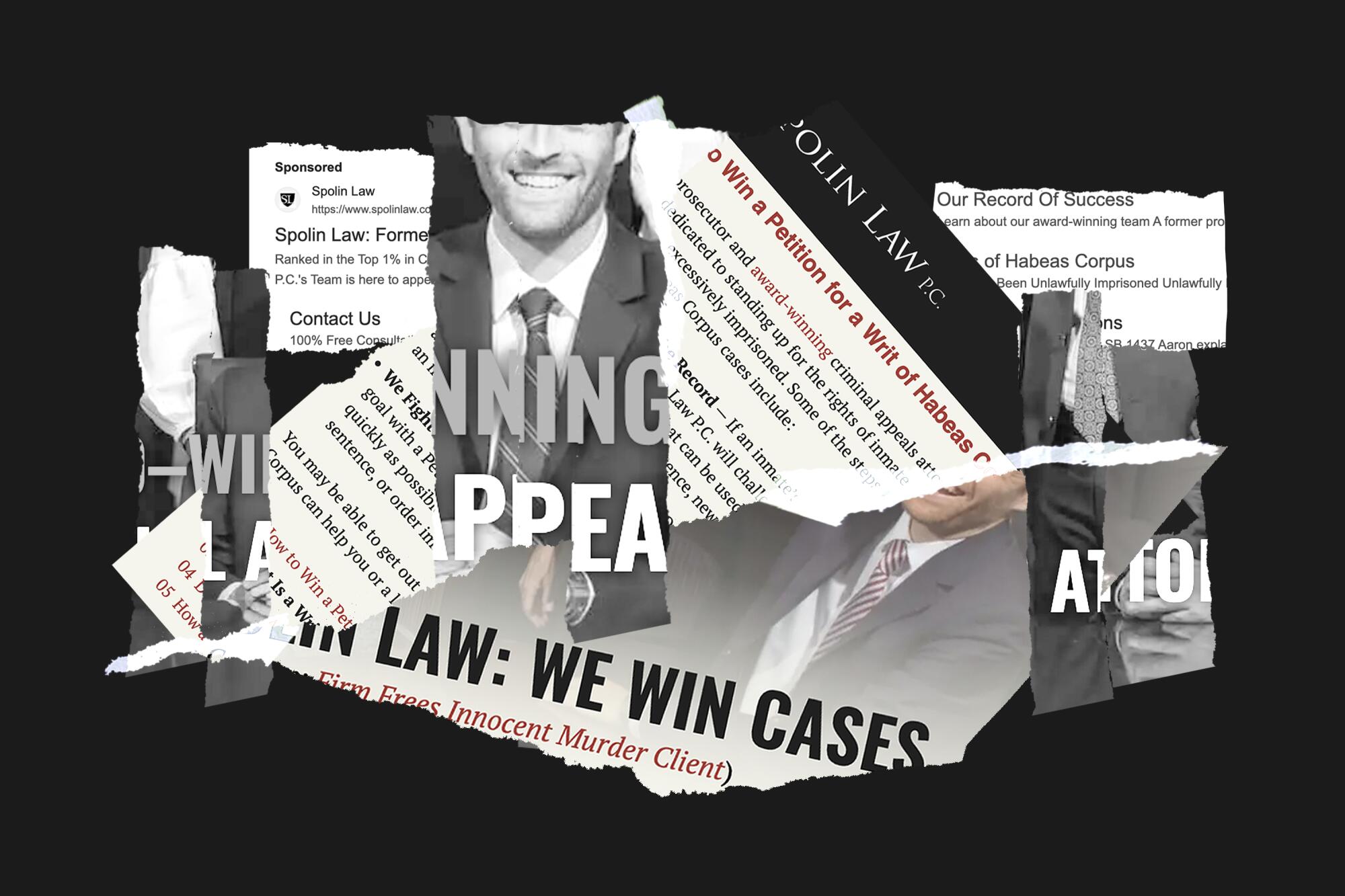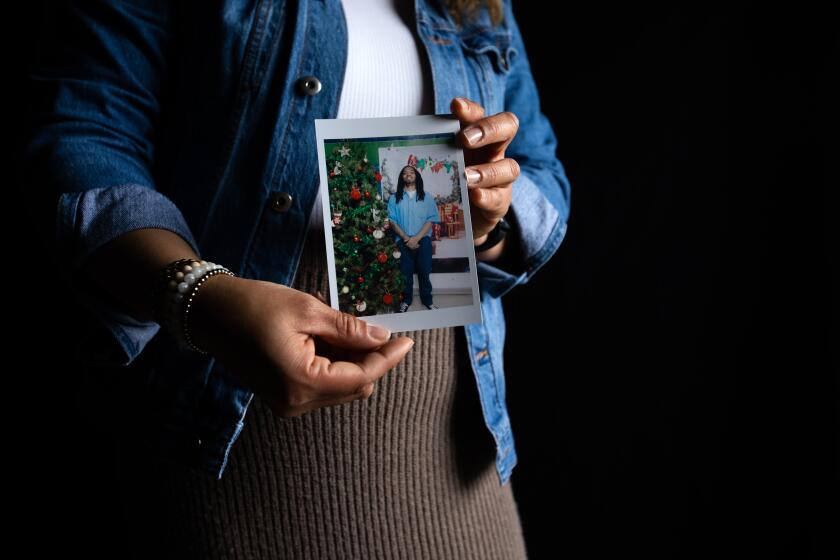
- Share via
Through his arrest, at age 19, for a murder in South L.A., through the trial where he received a sentence of 72 years to life, and through fruitless appeals, Abel Soto maintained his innocence.
In 2020, after he had been in prison for more than a dozen years, his family and friends set out to hire a lawyer who would prove once and for all that he was wrongfully convicted.
They went with Aaron Spolin — a decision Soto and his supporters would come to deeply regret. Rather than thoroughly investigate his case to turn up exonerating evidence, Spolin produced a thin court petition that contained unsubstantiated claims and was quickly rejected by a court.
“He told me, ‘If they give us a hearing, then that is when we will introduce the evidence,’ ” Soto said in a phone call from the state prison in Soledad. “That didn’t seem right to me. How are you expecting to get an evidentiary hearing without any evidence?”
Advertising himself as “California’s top-ranked habeas attorney,” Spolin charges more than $20,000 to pursue habeas corpus petitions, the complicated and consequential avenue in which prisoners who have exhausted their appeals make a last-ditch attempt to have a court overturn their convictions.
The Times found that Spolin’s firm failed to conduct investigative work or research that experienced habeas lawyers said was required. Federal, state and local courts have repeatedly called out Spolin’s petitions for lacking basic evidence.
A Times investigation found that Aaron Spolin built a booming enterprise by fanning the false hopes of inmates’ families.
In the petition he filed on Soto’s behalf in 2021, for example, Spolin listed eight individuals who could attest to his whereabouts on the day of the crime but did not interview them or submit sworn declarations from them.
In numerous other petitions reviewed by The Times, Spolin argued that clients should get a new trial because their previous lawyers hadn’t called expert witnesses. But he didn’t retain experts himself to present evidence to the court how their testimony might have resulted in a different verdict, common practice in habeas petitions.
“The Petition includes no exhibits or declarations from a video expert alleging what forensic video techniques would uncover in the video in question,” Alameda County Superior Court Judge Morris Jacobson wrote last year in refusing to overturn the conviction of Spolin client Alex Ivey.
A federal magistrate judge in L.A. evaluating a petition for a convicted murderer named Davione Wiley noted, “Petitioner has not explained what opinions a gang expert might have added that would have benefited his defense.” She added, “This court is not the forum for Petitioner to develop the evidentiary record.”
Top habeas experts said courts require detailed evidence in filings before considering whether to hold an evidentiary hearing.
“You have to have the raw evidence for the judge to analyze. You can’t just say, ‘I asked my lawyer to hire a ballistics expert and he didn’t do it.’ That’s nonsense,” said Cliff Gardner, who has done habeas cases in California for 40 years and represented Scott Peterson in his successful attempt to overturn his death sentence.
Shown some of Spolin’s filings, he said, “That’s a senseless, utterly inconceivable way of approaching a habeas petition.”
Presented by The Times with seven different cases in which courts noted flimsy evidence, Spolin asserted that judges in those cases and others were wrong from a constitutional standpoint. He said he did not submit the evidence other lawyers did on principle because “there shouldn’t be this incredibly high bar” for a judge to order an evidentiary hearing where witnesses could be subpoenaed and testimony given in open court. He described himself as waging a lonely but righteous quest to change the law comparable to the fight for gay marriage.
“I believe that if we keep knocking on the door like this, we will have a judge who will be brave enough to change the law,” he said in an interview at his office.
Asked whether he had conveyed this unusual strategy to clients’ families, Spolin said, “Often.”
‘You have to have the raw evidence for the judge to analyze. You can’t just say, “I asked my lawyer to hire a ballistics expert and he didn’t do it.” That’s nonsense.’
— Cliff Gardner
Ivey’s sister, Rosia, a psychologist who works with autistic children in L.A., denied he’d ever informed her of that view.
“That would have been a red flag for me,” said Rosia Ivey, who paid part of Spolin’s fees in installments and put part on her credit card. “We definitely would not have paid $28,000 for that.”
Angelia Spikes, who worked overtime as a mail carrier in Oakland to help pay for her brother Demond’s petition, also said Spolin never told her he was pursuing an unorthodox approach.
“I would never have given $20,000 for that. Hell no,” she said.
As in Soto’s case, the petition Spolin filed for Demond Spikes referenced the existence of an alibi witness, but did not include the man’s name, details of his account or a declaration. The petition was denied.
“I didn’t know they were supposed to do a declaration until I got with a jailhouse lawyer and he told me what they were supposed to do,” Spikes said. Of his sister’s financial sacrifice, he said, “My credibility in her eyes is damaged. We couldn’t afford that.”
Habeas petitions are long shots by their nature with failure rate estimated as high as 98%. “All presumptions favor the truth, accuracy, and fairness of the conviction and sentence,” oft-cited California case law states, putting a “heavy burden” on inmates to establish otherwise.
‘I believe that if we keep knocking on the door like this, we will have a judge who will be brave enough to change the law.’
— Aaron Spolin
Still, Erwin Chermerinsky, dean of UC Berkeley Law and co-author of a book on habeas, said the petitions are vitally important to a criminal justice system.
“I wouldn’t focus on how often it fails, I would focus on the times it succeeds. Otherwise, there would be times innocent people were put to death or died in prison,” he said.
At Spolin Law, drafting of habeas petitions sometimes fell to low-paid contract lawyers in other states, several said in interviews. Some said they were paid about $30 an hour and had no prior experience with appellate law. One contractor, who spoke on the condition of anonymity to protect job prospects, said the process was often chaotic with multiple people working on different portions of a single petition to meet a deadline.
Spolin said he and other firm lawyers analyzed every case and devised a strategy for each habeas petition, but that contractors have been used to find relevant case law and put it into the filing.
“That’s a job that many people can do,” he said, noting that their work is reviewed and edited by supervisors who are firm employees.
One is Daniel DeMaria, the firm’s head of legal research. Court records show New York authorities revoked DeMaria’s law license in 2017 for failing to disclose that he had been previously caught cheating on a take-home licensing examination in Canada.
Spolin said he was unaware of DeMaria’s record when he hired him, but kept him on because of the quality of his work on federal cases, saying, “He’s a great researcher.”
In Soto’s case, his family paid $21,500 for a habeas petition after a family friend, Requel Becker, spoke with a case manager. “She made me feel like they were going to try their best to get him exonerated.”
Becker was one of the people who had been with Soto on the day of the shooting, but she said the firm never asked her or the others to sign a declaration and she didn’t know that doing so was standard practice.
Soto and his family might have had to accept the quick denial of the petition had they not crossed paths with a volunteer working to exonerate the other man convicted in the 2003 shooting of a teenager.

The volunteer, Jessica Jacobs Dirschel, had pored through the police file and court record and concluded the other man, Jofama Coleman, was innocent. She reached out to the Soto family, learned he too maintained his innocence and eventually got a copy of the habeas petition Spolin had prepared.
“I was appalled,” recalled Dirschel, who described it as “amateur” and “shoddy.” In addition to the lack of witness declarations, she said, there was no indication that Spolin’s firm had obtained discovery from prosecutors, the trial transcripts the Coleman case or the police evidence, known as the murder book. “No investigation, no research.”
Dirschel and Ellen J. Eggers, a retired state public defender who works on exoneration cases, coached Becker and Soto on how to demand their money back, including by pressing Spolin about the information he had actually used in preparing the habeas.
“I am requesting a 100% full and immediate refund of the money my family paid your firm after being lured into an agreement with you that was based on aggressive advertising and/or false claims,” Soto wrote in a letter to Spolin, according to a copy shared with The Times. “It is not right what you are doing to desperate inmates and I hope you chose to do right by me by issuing a check for the full amount paid to you promptly.”
Spolin’s firm eventually returned most of the Sotos’ money, according to Becker.
Spolin declined to discuss Soto’s case in detail, but denied that returning the money was an admission of wrongdoing.
“We gave it back because we did not want to trouble with these people who clearly seemed troublesome,” he said.
Soto’s new legal team, led by Eggers, recently met with the L.A. district attorney’s office to present new evidence.
“They were extremely interested in it,” said Eggers, who has previously worked with the Northern California Innocence Project to exonerate three men. She said the exculpatory evidence includes a recorded interview with a key witness, just the sort of information a diligent habeas attorney would have turned up.
“It is especially egregious to think of an innocent guy getting screwed over,” Eggers said of what she sees as Spolin’s failures in Soto’s case. “But I hate the guilty guys getting screwed over too… They also deserve fair representation and competent counsel.”
More to Read
Sign up for Essential California
The most important California stories and recommendations in your inbox every morning.
You may occasionally receive promotional content from the Los Angeles Times.











